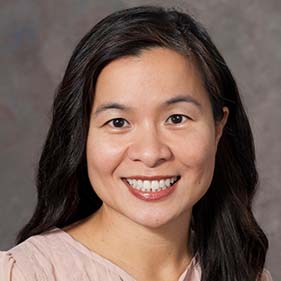UC Davis Health will play a key role in a new pilot program aimed at reducing Alzheimer's disease in the Sacramento region and throughout California.
The new Blue Zones Activate initiative, which aims to make the region dementia-friendly, is launching in Sacramento County, and UC Davis Health will be a partner on the project.
The initiative is one of the earliest endeavors resulting from the Governor's Task Force on Alzheimer's Prevention, Preparedness and the Path Forward.
The task force was launched in 2019 by Gov. Gavin Newsom and chaired by former first lady of California Maria Shriver. Other members included David Lubarsky, UC Davis Health CEO and vice chancellor of human health sciences, and UC Davis Health neurology researcher Oanh Meyer. Both Lubarsky and Meyer contributed to task force discussions, work groups and the proposals that were ultimately unveiled.
In 2020, the task force delivered 10 recommendations to better prepare California for an aging population and to prevent an expected surge in Alzheimer's cases. A recent study from the Alzheimer's Association estimated that 720,000 people in California live with Alzheimer's — more than any other state.
Now all that work is coming to fruition. In the 2020 report, Lubarsky noted, "[Caregivers] are saying 'we need help today.' And that is some help we can get literally to every caregiver in California in the next year."
His task force colleague Meyer is a UC Davis School of Medicine associate professor of neurology who studies cognitive and mental health disparities in minorities and older adults.
Meyer's advocacy contributed to one of the key recommendations in the report to keep California on the forefront of "cutting-edge global research."
She said, "As the most diverse state in the nation, we have an obligation and opportunity to be inclusive in our research and make an impact in reducing disparities that affect historically marginalized communities who are often more likely to be affected by Alzheimer's disease. I was proud to highlight the issue of diversity in science and the scientific workforce."
Meyer said she was "humbled and proud" to be on the task force and with a group of people seeking to make California a model for other states. "Good to see that our recommendations led to actual progress."
Also, she noted that the UC Davis School of Medicine is one of the five sites in the nation implementing the Alzheimer's Association-funded "U.S. POINTER study," which involves a clinical trial of lifestyle interventions based on diet, exercise, and more. The principal investigators are epidemiologist Rachel Whitmer and neuropsychologist Sarah Tomaszewski Farias.
As the most diverse state in the nation, we have an obligation and opportunity to be inclusive in our research and make an impact in reducing disparities that affect historically marginalized communities who are often times more likely to be affected by Alzheimer's Disease."-Oanh Meyer, associate professor of neurology
'Blue Zones': healthy and happy
California selected Sacramento County to roll out the new Blue Zones pilot program with the intention that it will serve as a blueprint for the state to replicate and adapt for other communities. It is the first community in California to use the Blue Zones model on Alzheimer's.
The Blue Zones and Sacramento County partnership will focus on equity, acknowledging the region is home to some of the most diverse populations in the state. Blue Zones and Sacramento County are now working together on an in-depth assessment to identify zip codes of greatest need. Black and Latino older adults are at an increased risk for Alzheimer's because of disparities in health care. According to an Alzheimer's Association report, 19 percent of Black and 14 percent of Latino adults over 65 have the disorder, compared with 10 percent of older white adults.
The company Blue Zones will implement the project. The name refers to "blue zone" regions around the world, where people live extraordinarily long, healthy and happy lives. The focus is on this single largest determinant of health — where people live. Instead of focusing on only changing individual behavior, Blue Zones aims to help communities make permanent changes to systems and surroundings so it's easier for residents to eat wisely, move naturally, and connect more with others throughout the day.
For example, by improving one's "life radius" — the area close to home where most Americans spend 90 percent of their lives — Blue Zones projects in other communities have dramatically improved overall population health and well-being. This has included raising employee and student productivity and boosting economic vitality and development.
Research, treatment and prevention
UC Davis' own Alzheimer's Disease Center is one of 27 nationwide designated by the NIH's National Institute on Aging. Its researchers study the effects of the disease in a uniquely diverse California population.
The center has hosted novel neuroimaging investigations that have significantly advanced understanding of brain changes associated with dementias. Director Charles DeCarli received the 2010 J. Allyn Taylor International Prize in Medicine for such work.
The center is now expanding its expertise with the addition of several large grants led by Whitmer, who brings a strong public health perspective to the study of dementia and its toll across populations underrepresented in research.
DeCarli and his team at the UC Davis Alzheimer's Disease Center have published data that show even modest exercise — something as simple as walking 10-20 minutes daily — can improve brain health at all ages.
Developing a life of learning is a close second to exercise in importance. Learning languages, taking up new hobbies, trying creative activities, engaging socially and looking for other new experiences have been shown to have strong positive impacts on brain health.
"Alzheimer's is a complex disease. In order to help Alzheimer's patients and their family caregivers as they navigate this illness, we need people at all levels and across sectors to work together," Meyer explained. "Public private partnerships are necessary to address treatment, care, and support for people with the illness and their caregivers."







